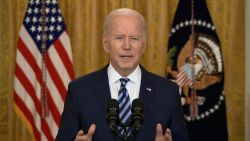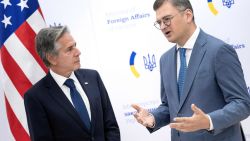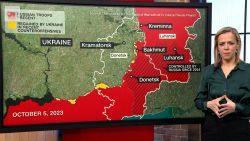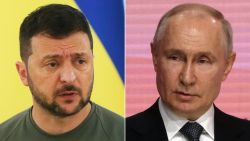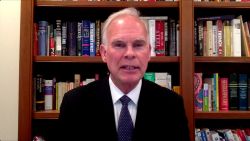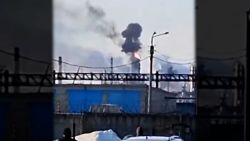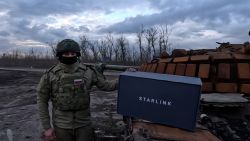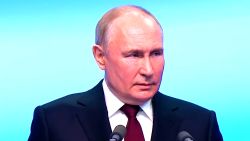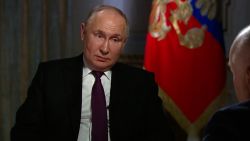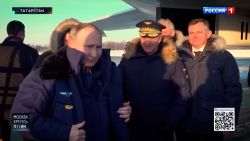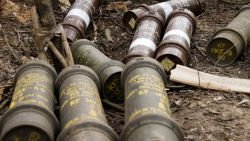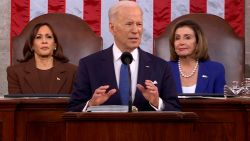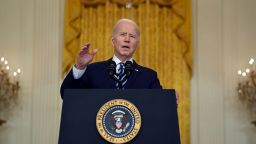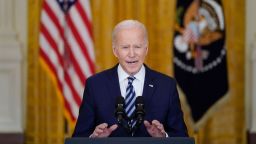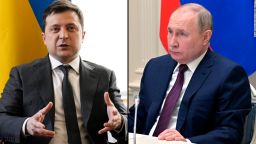Punishing sanctions were never going to stop Russian missiles, tanks and bombs. But the Biden administration hopes they offer an early edge in the first showdown of a new and dangerous 21st century coda to the Cold War.
Hours after Moscow launched its invasion of Ukraine, the US drew battle lines for what is sure to be a bitter standoff with the Kremlin likely to last at least until President Joe Biden or Russian President Vladimir Putin leaves power.
The US leader vowed on Thursday to make Putin a “pariah” by isolating Russian banks, punishing his rich cronies, supporting Ukrainians and containing the Kremlin’s attempt to roll back the outcome of the last generational Washington-Moscow struggle, which brought democracy to Eastern Europe.
While Russia seeks to clamp down on Ukraine, biting sanctions are sure to trigger a reaction that will escalate the confrontation between the Russian leader and the West. Referring to the impact of economic warfare, James Clapper, the former director of national intelligence, told CNN’s Erin Burnett: “I rather doubt Putin will sit still for that,” predicting he could seek to inflict pain on the US, for instance, with cyberattacks.
A third factor will also dictate this first chapter of the new US-Russia showdown – the capacity of the Ukrainian people to resist invasion, a possible occupation and what could turn out to be puppet pro-Moscow leaders. A related question of whether the United States should send arms to support a rebellion against Moscow is about to become a hot political issue in Washington.
History may record this as the moment when the United States girded for a second great, years-long confrontation against Russia – this time one rooted in a battle between democracy and autocracy, rather than between communism and capitalism.
“Putin’s actions betray his sinister vision for the future of our world, one where nations take what they want by force. But it is a vision that the United States and freedom-loving nations everywhere will oppose with every tool of our considerable power,” Biden said in his Thursday speech at the White House.
His message of freedom echoed President Harry S. Truman’s speech at the beginning of the original Cold War, which coined the Truman Doctrine that set the stage for years of US policy against the Soviet Union.
“Putin will be a pariah on the international stage. Any nation that countenances Russia’s naked aggression against Ukraine will be stained by association,” Biden said.
By ostracizing Russia, Biden will change the world. And there will be costs for the United States. Other nations will once again be forced to choose between Moscow and Washington. Putin, spurned in polite diplomatic society, will have an incentive to cause maximum possible disruption to US foreign policy. Russia has been a vital player in attempts to quell the Iran and North Korean nuclear showdowns but may now perceive an advantage in blocking Washington on issues vital to US national security. And Putin’s isolation may push him further toward China, America’s rising superpower rival, which has a strong interest in seeing the US bogged down in Europe.
But Biden has very little choice but to try to punish and contain Russia. The size of Putin’s invasion, his assault across Ukraine instead of in pro-Russia separatist areas and the alarming rhetoric that he spewed this week mean the world is in a far more dangerous place than it was three days ago.
“What do we do with a country that has simply flaunted the entire international system of rule of law?” asked Steve Hall, a former CIA chief of Russia operations, said on CNN on Thursday. “The answer is we somehow have to contain them and make them a pariah state,” Hall said.
Former US Ambassador to NATO Ivo Daalder agreed. “The need now is to focus on containing … and through containment effect internal change in Russia,” Daalder told CNN. “It’s the only way we won the Cold War and how we have to fight this new fight, which is not for weeks or months, it’s going to be years.”

Putin’s rhetoric cranks up the heat
That sense of a new and prolonged test of wills between the US and Russia has been fueled by Putin’s rhetoric and action in a shocking few days.
The enormous scale of the offensive in Ukraine so far is hardly the act of a leader willing to keep lethal force constrained. Its ambition is unmistakable as Putin seeks to change the established geopolitical outcome of the Cold War on the ground in Eastern Europe. The expansionist rhetoric in Putin’s speeches this week also raised the question of whether he plans to eventually move on other former Warsaw Pact territories – a far more dangerous proposition since those such as Poland, Romania and the Baltic States are now in NATO and enjoy the bloc’s self-defense protections. Russian incursions on one of these states could involve the US and Russia in direct combat and a cycle of escalation that, at worst, could end in nuclear war.
A feeling that the West and Moscow could be returning to the scary nuclear brink that saw millions live under the threat of instant annihilation for decades has been raised by the Russian President’s wild warning this week. “No matter who tries to stand in our way or all the more so create threats for our country and our people, they must know that Russia will respond immediately, and the consequences will be such as you have never seen in your entire history,” said Putin, who before the invasion took part in a theatrical test firing demonstration of Russian’s nuclear-capable missile arsenal.
Asked whether Putin was threatening nuclear war, Biden said Thursday he didn’t know. But the Russian leader’s untamed aggression toward the West, fixation on reversing the outcome of the Cold War and extreme demands for concessions that would buckle NATO have introduced a worrying and unpredictable element in international relations. Of course, Putin could be bluffing. Such behavior wouldn’t be surprising for a former KGB colonel trained to exacerbate his adversary’s greatest fears. But the cost of finding out could be unthinkable.
A hole in the sanctions regime
In past crises – with Iran, Iraq and Afghanistan, for instance – the capacity for even punishing sanctions regimes to trigger political change inside enemy nations has often been overestimated in Washington. Still, supporters of the Biden administration argue that the newly announced sanctions on Russia could have a significant effect, even if they are too little too late for some observers.
“They will put pressure on him,” Rhode Island Democratic Sen. Jack Reed told CNN’s Jake Tapper on “The Lead” on Thursday, noting unusual political demonstrations against Putin in Moscow.
Maximum pressure from sanctions takes time to build, another reason why the confrontation between the US and Russia figures to be prolonged. It also requires unity and can be undermined by US adversaries who break sanctions blockades. This may be where Putin’s recent visits for talks with Chinese President Xi Jinping turn out to be extra significant. And even the current US and allied sanctions are not as strong as they could be.
Biden admitted on Thursday that European nations were not yet ready to throw Russia out of the SWIFT financial messaging system, which is the backbone of global banking payments, trades and currency exchanges. Expelling Russia would severely inconvenience nations like Germany, which rely on the system to buy Russian natural gas and oil exports. The dilemma underscores how reliance on Moscow’s energy could undermine NATO unity.
Ukrainians area already fighting the battle
Ukrainian President Volodymyr Zelensky said Thursday that 137 Ukrainian solders had been killed since the invasion began and 316 soldiers had been wounded. Ukraine claims to have shot down several Russian jets and helicopters. Given the superior numbers of Russian troops, it is inevitable that Ukraine will eventually fall. But many experts believe that a long insurgency could develop, and raise the cost for Putin of the invasion.
Secretary of State Antony Blinken told lawmakers in a conference call on Thursday that the battle for Ukraine would take “a long time to play out.”
CNN’s Manu Raju, citing a source familiar with the call, reported that Blinken said that the endgame of the invasion would be dependent on the Ukrainian people.
“Will they allow themselves to be subjected to a puppet government?” he asked, according to the source.
Blinken’s comments pointed to one of Putin’s greatest vulnerabilities in the crisis. A country the size of Ukraine cannot be subdued even with around the 190,000 troops that Putin massed on the borders if the populace wants to revolt. A puppet government installed by Russia would not only face questions of legitimacy. It could trigger the kind of popular uprising that took place in 2014 and ousted Putin-backed Ukrainian President Viktor Yanukovych, which led directly to the current invasion that is meant to crush Ukraine’s democracy and dreams of moving toward the West.
The extent of Ukrainian resistance is critical to US policy going forward since it would weigh on the question of whether Washington would fund an insurgency in the country, which would mirror the 1980s effort that helped oust Soviet troops from Afghanistan. There’s strong support in Congress but it would also potentially require the cooperation of European states to serve as transit routes, and they may be wary of antagonizing Putin further. Phil Mudd, a former CIA counterterrorism official who is now a CNN analyst, said US intelligence agencies would be trying to establish the effectiveness of the Ukrainian defense and whether there were opportunities to to help.
“We focused on one piece, ‘What are the Russians doing?’ Now some of the attention has got to shift to the other piece – can we help the Ukrainians?” Mudd told Tapper.
The idea that the United States would end up effectively fighting a proxy war in Europe against Russia after 30 years of peace would have been unbelievable even a few months ago, despite tense relations with Moscow.
But it may become a new reality in a new Cold War-style duel with Russia.


